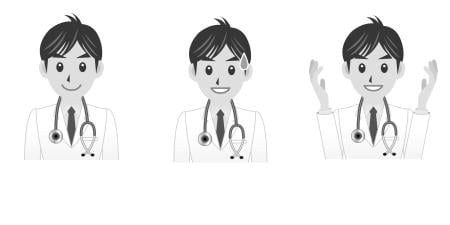Case
Throughout college, Joshua got A's in classes by cramming for his exams. Now in his first semester of medical school, he finds this study strategy is still working reasonably well for him. In fact, he has scored close to the class average on all of his exams so far—anatomy, physiology, genetics, and cell biology. He makes it a point to attend every lecture so he can take notes on what he believes to be the "core concepts" the lecturer is trying to convey. He then studies from his notes in marathon, all-night study sessions starting 3 days before the exam. Consequently, his study strategy involves ignoring most of the smaller details since they'd be impossible to cram before the exam. He is a little concerned about skipping these details but figures "it's med school and I need to do whatever is necessary to survive." After all, his grades so far have proven to him that knowing the core concepts is enough to get by.
Despite his avid interest in lectures, Joshua does not like attending small group conferences where 10 to 12 students discuss case studies or basic science vignettes in an interactive, problem-solving format. He thinks the conferences are a waste of time since they don't focus on the "core concepts," and he usually forgets all of the minutiae discussed there by the week of the test anyway. He particularly dislikes the cell bio conferences, which he considers useless and impractical. He regularly complains to other students that "the bio conference is stupid. Why does a medical doctor need to know anything about signaling molecules or G-proteins? This won't ever help me care for my patients."
Joshua knows that the cell bio conference material constitutes only a small part of the final exam. If he skipped the conference, he thinks he could still pass the course without a problem. Still, he shows up for conferences since attendance is taken. He refuses to prepare for the case vignette discussion questions because it requires "a lot of work for little return." In conference, he constantly pretends to search through his notes to avoid eye contact and dodge being called on. The few times he was asked to contribute to the discussion, he joked his way out of having to provide an answer. And when the group discussion heads off on a tangent, he shows his disapproval and lack of interest by placing his head on the table. Other students avoid including him in the discussion since they know he never has anything to contribute and likes to make cynical comments under his breath about their interest in "boring details." Joshua's only pleasure comes from knowing that at the end of the semester he will have an opportunity to critique the cell bio conference thoroughly so future students won't have to suffer through it like he did.
Commentary 1
Higher learning can teach some strange lessons. As an undergraduate, I majored in biology. My college roommate, who is now a painter, majored in anthropology. We chose our majors because we found them to be interesting vehicles for developing our abilities to think about problems. But along the way to graduation, we lost sight of our noble goals. One night, after some heady dinner conversation, our stomachs knotted as we realized that we could have read a library of books on interesting, related topics, but the quantification of our "knowledge" would ultimately be summarized by 1 of 5 letters on a grade sheet outside the professor's office. The primacy of "key concepts" on our final evaluation was reinforced so many times that we became obsessed with them. By senior year, my peers would ask the professors in review sessions, "Will this be on the test?"
College students become experts at culling through large volumes of material, figuring out what is testable and discarding the rest. College students who become medical students are among of the best of them.
Joshua is obviously a very bright and talented student. With minimal effort he obtained A's on his college exams and, because the preclinical years resemble college, he is approaching them in a similar manner. Unfortunately for Joshua, medical training is very different from college coursework. The goal of medical school classes is not solely to develop an ability to think, but to apply that ability to a fund of knowledge and heal patients. Cramming is a horrible way to develop that fund of knowledge. A complete review of the literature on long-term recall is beyond the scope of this piece. But, aside from countless psychiatry and neurology texts and articles, a recent study using computer-timed, web-based teaching modules attempted to validate "the hypothesis that learning takes time"1 and succeeded. The bottom line: for lifelong learning, cramming is poor practice.
That said, Joshua may find himself in something of a bind. Between anatomy lab, lectures, and assigned reading, perhaps he just doesn't have time to adequately prepare for his conferences. Even Sir William Osler noted at the beginning of the last century, "The student needs more time for quiet study, fewer classes, fewer lectures, and above all, he needs the incubus of examinations lifted from his soul."2 Sadly, modern medical school has done seemingly the opposite. If we accept the "hypothesis" that learning takes time, just how much can Joshua learn in the preclinical years? The science, techniques, and skills that must be learned by young physicians today have grown tremendously in the past 20 years. Could we even have conceived of a DNA chip 20 years ago?
The Principles of Medical Ethics put forth by the American Medical Association in June 2001 call on the physician to, "continue to study, apply, and advance scientific knowledge."3 The Prayer of Maimonides pleads, "Let me be contented in everything except the great science of my profession. Never allow the thought to arise in me that I have attained to sufficient knowledge… For art is great, but the mind of man is ever expanding."4 In the Islamic Code of Medical Ethics the physician swears, "to strive in the pursuit of knowledge and harnessing it for the benefit, but not the harm of mankind."5 For 310 years (the earliest written copies of the Prayer of Maimonides date back to 1793) we can find codified the idea that the practice of medicine is intimately entwined with an evolving body of scientific knowledge. Advances in the basic sciences virtually guarantee that standard-of-care today will not be standard-of-care tomorrow. Joshua's desire to grasp just the "core concepts" will be incompatible with the reality of his practice in the future.
A shift in Joshua's thinking must occur. He does not want to do a "lot of work for little return" because he knows that the test will not quantify his knowledge and skills. And he is right. But the medical classroom is not about preparing for the test, it is about preparing To join a profession. It is learning with application. Small groups, although they look like sections of large college lecture courses, have a greater goal. Virtually all the codes of ethics mentioned above emphasize learning from peers and sharing of knowledge as core values of the medical profession. Small group sessions are the medical students' first chances to develop the communication style and interpersonal skills to do so. Communication with peers will occur not just in the basic sciences; there will be tumor boards, consults, and journal clubs which, if performed with a love of learning, will enrich Joshua's medical practice and enhance the health of his patients. That will be the measure of his success.
Sir William Osler noted, "The hardest conviction to get into the mind of a beginner is that the education upon which he is engaged is not a college course, not a medical course, but a life course, for which the work of a few years under teachers is but a preparation."6 The second word of the title "medical student" lulls many young physicians into their old ways and motivations. Only when Joshua realizes that he must be a physician first and a student always, will he find satisfaction in his studies.
References
- Taraban R, Rynearson K, Stalcup KA. Time as a variable in learning on the World-Wide Web. Behav Res Methods Instrum Compute. 2001;33(2):217-225.
-
Virtual Hospital Web site. Sir William Osler: aphorisms from his bedside teachings and writings, #47. Accessed September 25, 2003.
-
American Medical Association. Principles of medical ethics. Code of Medical Ethics, 2002-2003 edition. Accessed September 15, 2003.
-
Medterms Web site. Prayer of Maimonides. Accessed September 15, 2003.
-
Physicians for Human Rights Web site. Islamic code of medical ethics. Accessed September 15, 2003.
-
Virtual Hospital Web site. Sir William Osler: aphorisms from his bedside teachings and writings, #3. Accessed September 25, 2003.



